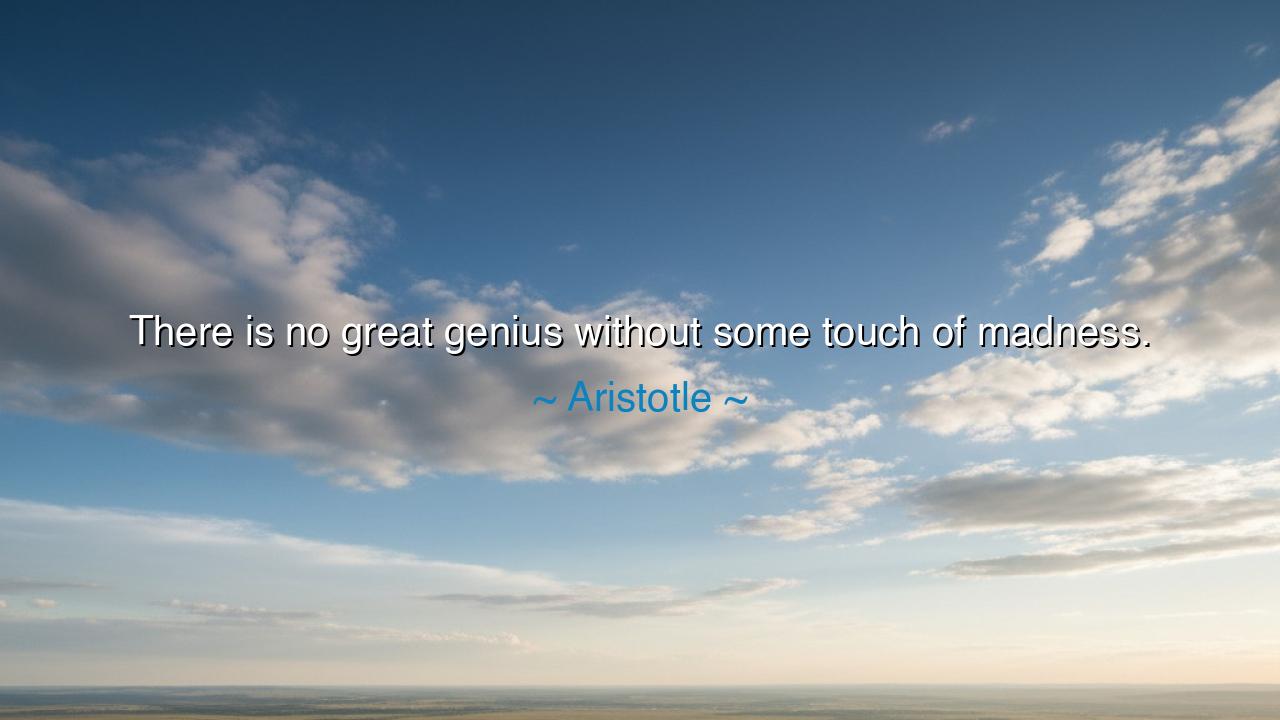
There is no great genius without some touch of madness.






Hearken, children of the ages yet to come, and absorb the enduring wisdom of Aristotle, who declared: “There is no great genius without some touch of madness.” In these words lies a profound meditation on the nature of brilliance, the passion of creation, and the thin veil that separates insight from folly. The ancients understood that genius is not born from meekness or conformity, but from a spirit daring enough to wander beyond the bounds of ordinary thought.
The “touch of madness,” Aristotle tells us, is not chaos without reason, but a spark of vision unbound, a willingness to perceive what others cannot, to question what others accept. All great minds—philosophers, inventors, artists—have walked this fine line between inspiration and obsession. The ancient poets spoke of divine madness, believing that the Muses themselves bestowed creativity upon those who dared to surrender to their inner fire. Thus, madness is the companion of genius, not its adversary.
Consider the life of Leonardo da Vinci, who sketched flying machines centuries before wings could bear a human, who dissected bodies to understand life itself, who poured countless hours into inventions and paintings with an intensity bordering on obsession. Many might have called him mad, yet his vision shaped centuries. The touch of madness Aristotle speaks of is the courage to see beyond convention, to risk the ridicule of the world in pursuit of the truth hidden in nature and imagination.
Similarly, the poet Emily Dickinson, who shunned society yet produced verses that pierced the soul, embodies this principle. Her isolation and unconventional habits might have seemed eccentric, yet they were inseparable from her genius. The ancients would have recognized her as touched by the divine spark, for she perceived realities that others could not, transmuting solitude into profound insight. Genius and madness dance together, each feeding the other, revealing truths that the ordinary mind cannot grasp.
Aristotle’s insight also reminds us that the path to brilliance is often uncomfortable, even perilous. The genius is a pioneer of thought, standing on the edge of understanding where few dare to tread. To think differently, to challenge accepted wisdom, to pursue ideas beyond the norm—this requires a boldness that borders on irrationality. The ancients revered such courage, teaching that the soul must embrace both reason and its own inner fire to achieve greatness.
From this teaching, a lesson emerges for all seekers of wisdom: do not fear your unconventional thoughts or your intense passions. They may appear strange, even unsettling, but they are the seeds of discovery. Study diligently, cultivate your talents, and allow your imagination to wander, for the touch of madness within you may be the catalyst for creation, insight, and transformation.
Practical guidance flows naturally: pursue ideas that excite and challenge you, even when they seem impractical or audacious. Surround yourself with those who can temper your excesses but do not stifle your vision. Engage deeply with your passions, and do not be deterred by skepticism or the narrow expectations of the world. Remember Aristotle’s teaching: the extraordinary is born where reason and daring meet, and genius is inseparable from its touch of madness.
Children of the ages, let this truth anchor your hearts: greatness is never gentle, conformity never revolutionary. Embrace the fire within, honor the spark that sets your mind and soul aflame, and dare to pursue the uncharted paths of knowledge and creation. For it is there, at the precipice of understanding, that genius lives, illuminated by the light of insight and the shadow of the madness that makes it human, profound, and eternal.
If you wish, I can also craft a more dramatic, oral version, with vivid imagery and heroic rhythm, making Aristotle’s words feel like a spoken teaching echoing through the ages, perfect for narration. Do you want me to do that?






AAdministratorAdministrator
Welcome, honored guests. Please leave a comment, we will respond soon